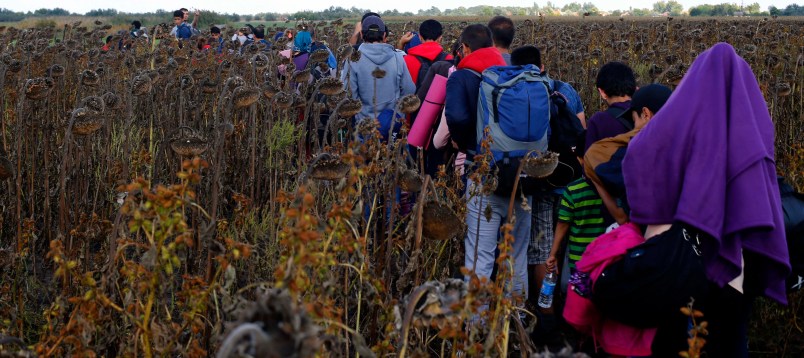BERLIN (AP) — Germany saw about 280,000 new asylum-seekers arrive last year, less than a third of the previous year’s huge influx of 890,000, the interior minister said Wednesday.
While new arrivals declined, Interior Minister Thomas de Maiziere said that the number of rejected asylum-seekers who left Germany was up — though still not to authorities’ satisfaction. In total, 80,000 people either left voluntarily or were deported, he said.
Arrivals declined sharply with the closure of the Balkan migrant route in March and the subsequent agreement between the European Union and Turkey to stem the flow across the Aegean Sea to Greece.
Asylum applications have lagged well behind arrivals and many people who came to Germany in 2015 applied only last year.
Wednesday’s figures showed that 745,545 formal asylum applications were made last year — 268,869 more than in 2015. Those included 268,866 applications from Syrians, 127,892 from Afghans and 97,162 from Iraqis, the biggest single groups by far.
The Federal Office for Migration and Refugees, which has been beefed up in the course of Europe’s migrant crisis, decided last year on more than 695,000 asylum applications, more than twice as many as in 2015. Nearly 60 percent of applicants were granted either full refugee status or a lesser form of protection. The agency has also cut the average time required for an asylum decision to under three months, and introduced a nationwide database to combine identity records for all asylum-seekers.
De Maiziere said that about 55,000 migrants returned home voluntarily last year, compared with the previous year’s 35,000. Another 25,000 were forcibly deported.
Chancellor Angela Merkel, who faces a national election later this year and still draws criticism for her welcoming approach to migrants in 2015, has promised a “national effort” to ensure that people who aren’t entitled to stay go home.
The number of returns is still too low, de Maiziere said, adding that talks are underway with state authorities — who are responsible for returns — to push it up.
De Maiziere rejected the suggestion that the drop in new arrivals was the result of Europe’s efforts to prevent people reaching the continent, but acknowledged that Germany was working to ensure refugees stay in their home region.
Copyright 2017 The Associated Press. All rights reserved. This material may not be published, broadcast, rewritten or redistributed.







Russia just ordered an aircraft carrier home…
Once it reloads… they’ll see if they can’t get the numbers back up —
Meanwhile, there are 160,000 rejected asylum seekers roaming the German landscape, planning terrorist attacks, unable to work or bring in their families. This number of 280,000 probably include 20,000 that will eventually gain asylum, and 260,000 who will not. The German elections are 7 months away. The clock is ticking, and Merkel’s fuse is burning. Something is going to happen this summer, and my guess is that it will not make the open-border fools happy.